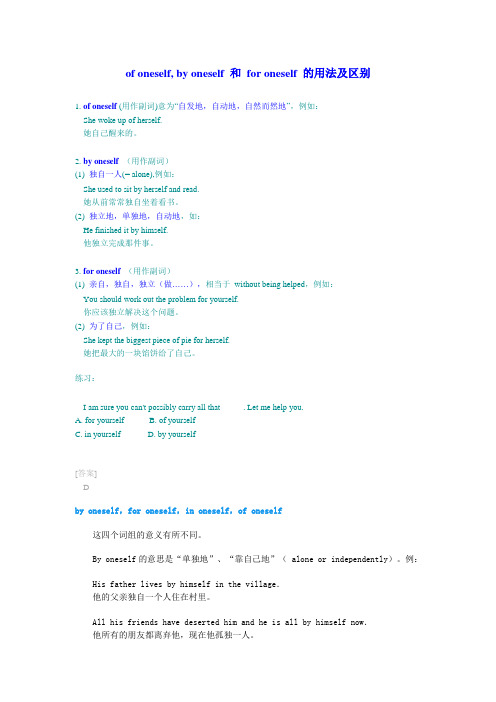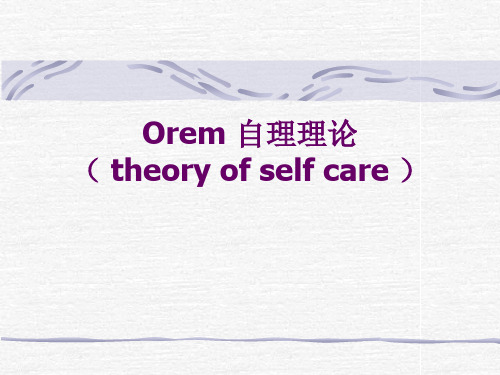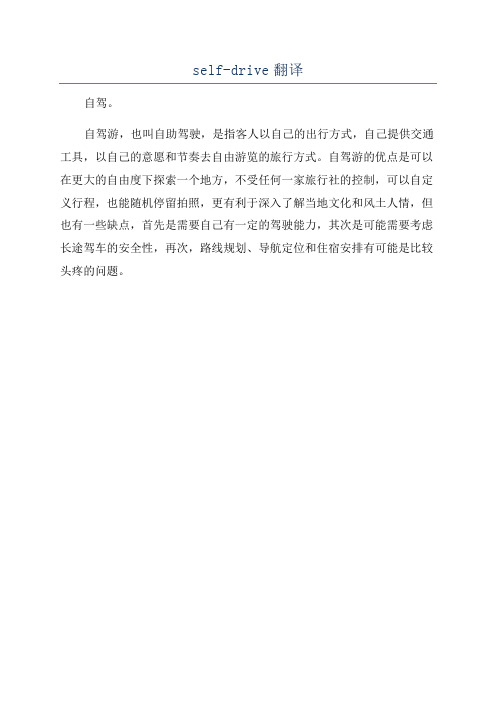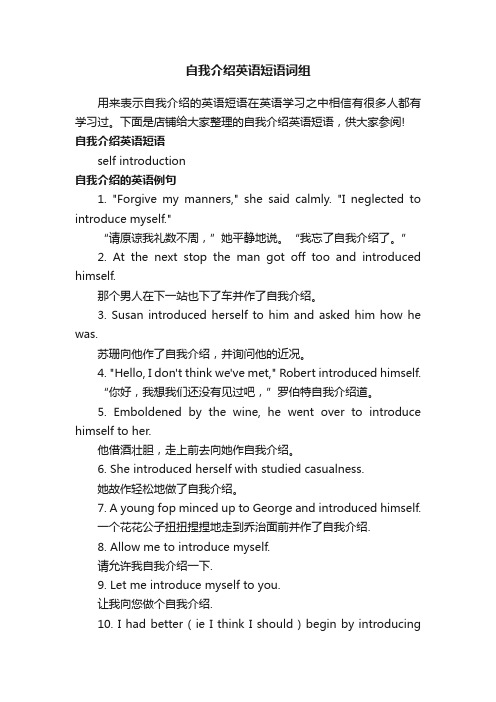Self -Check & Reading
selfintroduction范文及翻译

selfintroduction范文及翻译大家好,我是李斯。
非常感谢公司给予我这次机会,允许我在这里进行自我介绍。
我毕业于清华大学的计算机科学专业,之后进入中国最大的IT企业工作。
7年来,我一直从事项目管理和软件开发工作,并且逐步成长为一名资深项目经理。
在我的工作中,我始终坚持以客户为中心的理念,致力于提供高质量的产品和服务,得到了客户们的认可。
同时,我也注重提升团队内部的协作效率,并经常参加与技术相关的培训和活动,以不断更新自己的知识和技能。
除了工作之外,我非常喜欢读书、旅游和尝试新的运动方式。
阅读使我可以不断扩宽视野和积累知识,旅行则让我体验到了不同文化的魅力,同时也锻炼了我的勇气和适应能力。
新的运动方式则成为了我的放松方式,保持身心健康。
对于未来的职业规划,我希望能够进一步提高自己的技能水平,争取成为具有领导才能的高级项目经理。
希望能够贡献自己的智慧和力量,与公司一起成长发展。
最后,再次感谢聆听我的介绍,期待未来的合作与交流。
谢谢!Self-Introduction (Translation)Hello everyone, I am Li Si. Thank you very much for giving me this opportunity to introduce myself here.I graduated from the computer science major of Tsinghua University and joined the largest IT company in China after graduation. For the past 7 years, I have been engaged in project management and software development work, and gradually grown into a senior project manager.In my work, I always adhere to the customer-centric concept, committed to providing high-quality products and services, which has been recognized by customers. At the same time, I also focus on improving collaboration efficiency within the team, and often participate in technology-related training and activities to constantly update my knowledge and skills.Apart from work, I enjoy reading, traveling, and trying new sports. Reading allows me to continually broaden my horizons and accumulate knowledge, traveling enables me to experience the charm of different cultures, and also improves my courage and adaptability. Trying new sports becomes my way to relax and maintain physical and mental health.For future career planning, I hope to further improve my skills and become a senior project manager with leadership capabilities. I want to contribute my wisdom and strength and grow together with the company.Finally, thank you again for listening to my introduction, and I look forward to our cooperation and communication in the future. Thank you!。
of oneself,for oneself,by oneself区别

of oneself, by oneself 和for oneself 的用法及区别1. of oneself (用作副词)意为“自发地,自动地,自然而然地”,例如:She woke up of herself.她自己醒来的。
2. by oneself (用作副词)(1) 独自一人(= alone),例如:She used to sit by herself and read.她从前常常独自坐着看书。
(2) 独立地,单独地,自动地,如:He finished it by himself.他独立完成那件事。
3. for oneself (用作副词)(1) 亲自,独自,独立(做……),相当于without being helped,例如:You should work out the problem for yourself.你应该独立解决这个问题。
(2) 为了自己,例如:She kept the biggest piece of pie for herself.她把最大的一块馅饼给了自己。
练习:I am sure you can't possibly carry all that _____. Let me help you.A. for yourselfB. of yourselfC. in yourselfD. by yourself[答案]Dby oneself,for oneself,in oneself,of oneself这四个词组的意义有所不同。
By oneself的意思是“单独地”、“靠自己地”( alone or independently)。
例:His father lives by himself in the village.他的父亲独自一个人住在村里。
All his friends have deserted him and he is all by himself now.他所有的朋友都离弃他,现在他孤独一人。
Orem 自理理论(self care theory)

一般的自理需要(universal self-care requisites) 成长发展的自理需要(development selfcare requisites) 健康不佳时的自理需要(health deviation self-care requisites)
自理能力包括10方面的内容
重视和警惕危害因素 控制和利用机体的能量 控体位 认识疾病和预防复发 对疾病的态度 对健康问题的判断 学习和运用与疾病治疗和康复相关的知识和技能 与医务人员的有效沟通和配合 安排自我照顾的行为 寻求支持和帮助
自理体 (self-care agent)
指能完成自理活动的人 正常情况下,成人的自理体是其本身 儿童、病人或残疾人等的自理体部分是 自己、部分为健康服务者或照顾者
Orem 四个概念的陈述
健康
同意WHO的健康定义:健康不只是没有疾 病和衰弱,而是身体、精神和社会方面的完 好状态 各个方面是有联系的 维持健康要以预防保健为主(一级预防), 并辅以治疗疾病为目的的二级预防和以预防 并发症为主要目的的三级预防
Orem 四个概念的陈述
环境
是人以外的所有因素,包括物理的、心理的 和社会的等方面 与人组成统一整体 人利用各种技能去控制环境或改变环境,以 满足自理需要 不能满足自理需要的人会从别人处得到帮助 自我帮助和帮助他人都是对社会有价值的活 动
Orem的护理程序
诊断与处治 设计与计划 实施与调整
诊断与处治
确定病人为什么需要护理
病人的健康状况 医生对病人健康的意见 病人对自己健康的认识 病人的自理需要 病人的自理能力
设计与计划
计划如何提供护理
设计护理系统 制定护理方案
self后缀用法

self后缀用法
"self" 后缀通常可以用于表示自身或者独立存在的事物。
以下
是几个常见的用法:
1. 自我:self-assertive(自我主张的)、self-conscious(自我意识的)、self-esteem(自尊心)、self-confidence(自信心)等。
2. 自身特征或状态:self-centered(自我为中心的)、self-reliant(自力更生的)、self-sufficient(自给自足的)等。
3. 动词加 self 后缀,表示自主性或自动性:help oneself(自己
帮助自己)、express oneself(表达自己)、control oneself
(控制自己)等。
4. 指示性代名词:myself(我自己)、yourself(你自己)、himself(他自己)等。
5. 序数词的反身形式:first self(第一自身)、second self(第
二自身)等。
6. 抽象名词加 self 后缀,表示相应的行为或活动:self-harm
(自残)、self-defense(自卫)、self-analysis(自我分析)等。
请注意,以上只是一些常见的用法,实际上还有其他不同的用法和意义。
self-conscious英文解释

self-conscious英文解释Self-consciousness is a complex and often misunderstood concept in psychology. It refers to the awareness of oneself as a separate entity, distinct from other individuals and the external world. This awareness includes the ability to reflect on oneself, evaluate one's own thoughts and behaviors, and consider how one is perceived by others. Self-consciousness can manifest in different ways and can have both positive and negative implications for an individual's well-being.One aspect of self-consciousness is self-awareness, which involves the ability to recognize one's own thoughts, feelings, and behaviors. This self-awareness allows individuals to monitor and regulate their own actions, make decisions based on their values and goals, and adapt to changing circumstances. For example, someone who is self-aware may be able to identify their strengths and weaknesses, set realistic goals for themselves, and take steps to improve their performance in various areas of their life.Another aspect of self-consciousness is self-evaluation, which involves comparing oneself to internal or external standards. This process can lead to feelings of pride or shame, depending on how well an individual believes they are meetingthese standards. For example, someone who surpasses their own expectations may feel a sense of accomplishment and satisfaction, while someone who falls short of their goals may experience feelings of failure and inadequacy.Self-consciousness can also involve an awareness of how one is perceived by others, known as public self-consciousness. This type of self-consciousness can lead individuals to monitor their behavior more closely in social situations, try to conform to social norms, and seek approval from others. However, excessive public self-consciousness can also lead to social anxiety, fear of rejection, and a reluctance to express one's true thoughts and feelings.Overall, self-consciousness can have both adaptive and maladaptive effects on an individual's mental health andwell-being. On one hand, self-awareness and self-evaluation can promote personal growth, self-improvement, and a sense of authenticity. On the other hand, excessive self-consciousness and self-criticism can contribute to low self-esteem, perfectionism, and emotional distress.In conclusion, self-consciousness is a multifaceted concept that plays a significant role in shaping our thoughts, emotions, and behaviors. By developing a healthy sense of self-awareness,self-evaluation, and self-acceptance, individuals can cultivate a more balanced and positive relationship with themselves and others. It is important to recognize the role of self-consciousness in our lives and strive to cultivate a sense of self-awareness, self-acceptance, and self-compassion.。
提高自我意识和自我反思的能力的英文

提高自我意识和自我反思的能力的英文提高自我意识和自我反思的能力是个人成长和发展的关键。
以下是一些有用的英文词汇和短语,可以帮助你更好地理解和掌握这些能力:
1. Self-awareness 自我意识
2. Reflection 反思
3. Mindfulness 正念
4. Introspection 内省
5. Perception 感知
6. Observation 观察
7. Self-examination 自我检查
8. Self-evaluation 自我评估
9. Self-reflection 自我反思
10. Self-discovery 自我发现
11. Self-improvement 自我改进
12. Personal growth 个人成长
13. Self-realization 自我实现
14. Self-actualization 自我实现
15. Emotional intelligence 情商
16. Empathy 同理心
17. Self-esteem 自尊
18. Confidence 自信
19. Assertiveness 自信
20. Self-regulation 自我调节
通过学习和应用这些词汇和短语,你可以开始提高自我意识和自我反思的能力,更好地了解自己,认识自己的优点和缺点,并在自我发展和成长的过程中取得更好的结果。
selfish用法

selfish用法Selfish用法Selfish是一个常用的英语词汇,指代自私或自利的行为或态度。
在日常生活中,我们经常会遇到各种与selfish相关的用法。
本文将详细介绍一些常见的selfish用法,并为每个用法提供解释和例句。
Selfish作为形容词1. Selfish意为自私的,形容一个人或行为追求自己的利益而不顾他人的感受或需要。
例句:She is a selfish person who never thinks about others.2. Selfish behavior意为自私的行为,指一个人的行为或举止表现出无视他人需要或利益的自私特征。
例句:His selfish behavior caused a lot of problems forhis friends.3. Selfish motive意为自私的动机,指导致一个人行为自私的原因或动机。
例句:His selfish motive behind helping others was to gain their trust for personal gain.Selfish作为名词4. Selfishness意为自私(的行为或态度),是selfish的名词形式。
例句:Her selfishness led to the breakdown of their friendship.5. Selfish person意为自私的人,指一个普遍表现出无视他人需求的自私行为的个体。
例句:He doesn’t care about anyone else; he is a selfish person.6. Selfishness vs. selflessness意为自私与无私,指相反的两种特征或行为。
例句:The debate focused on the contrast between selfishness and selflessness in human nature.Selfish用法扩展7. Selfish genes意为自私的基因,指理论上基因在生物进化中为了自我保存而驱动个体行为。
自我接受英语作文模板

自我接受英语作文模板英文回答:Self-Acceptance: A Journey Toward Unconditional Love of the Self。
Self-acceptance is the ability to embrace all aspects of oneself, both positive and negative, without judgment or criticism. It is a journey that involves recognizing and valuing one's unique qualities, strengths, and weaknesses. When we truly accept ourselves, we cultivate a deep sense of self-love and compassion, which empowers us to live more authentic and fulfilling lives.Embracing self-acceptance is not an easy task. It requires a willingness to confront our inner demons and to challenge the limiting beliefs and expectations that society often imposes upon us. It means learning to let go of perfectionism and to embrace our flaws as part of what makes us truly human.There are various ways to cultivate self-acceptance. One powerful practice is self-reflection. By taking time to reflect on our thoughts, feelings, and behaviors, we can gain a deeper understanding of who we are and what we value. This process can help us to identify and change negativeself-talk and to replace it with positive affirmations.Another important aspect of self-acceptance is self-compassion. When we treat ourselves with kindness and understanding, we create a space for growth and healing. We learn to forgive ourselves for our mistakes and to see them as opportunities for learning. By practicing self-compassion, we develop a more resilient and compassionate relationship with ourselves.Additionally, surrounding ourselves with supportive and loving people can greatly contribute to our self-acceptance journey. When we have people in our lives whounconditionally accept us for who we are, we feel valuedand supported. Their positive reinforcement can help us to challenge negative self-perceptions and to believe that weare worthy of love and respect.Self-acceptance is an ongoing journey, but it is one that is well worth taking. When we fully accept ourselves, we unlock our full potential and live a life that is true to our authentic selves. We become more confident, resilient, and compassionate individuals who are able to embrace life's challenges with grace and acceptance.中文回答:自我接纳,迈向无条件自爱的旅程。
歌曲《Self》歌词

Self--陈绮贞
几次悔过掩埋狂妄的恶魔
感觉却好像毁弃善良的自我
几次脆弱掩饰不甘的示弱这就是我
再说我也不特别渴求永久
其实我也无法忠于单一感受
静止了沉溺了无声的灭绝晕眩
是我拒绝你已清醒的双眼
是我召唤你眼底的错觉
就让我用力砸碎轻声的诺言
拥抱瞬间是我用真实的编造了谎言
也是我用残破的猜测这世界
就让我回应你已失序的狂野
虚伪瞬间是我几次悔过掩埋狂妄的恶魔这感觉却好像毁弃了善良的自我
静止了沉溺了无声的灭绝退怯
是我拒绝你已清醒的双眼
是我召唤你眼底的错觉
就让我用力砸碎轻声的诺言
拥抱瞬间是我用真实的编造了谎言
就算我用残破的猜测这世界
再一次回应你已失序的狂野
我们表演是我用真实的编造了谎言
就算我用残破的证实这世界
再一次让我尝尽犯错的甜美
甜美瞬间是你带我经过纯洁的瞬间无悔无邪。
self组合的单词

self组合的单词
self组合的单词是指由单词的开头字母加上单词本身组成的新词。
这种构词方式常用于创造新的词汇,以表示与自我相关的概念。
下面是一些常见的self组合单词及其含义:
1. Self-esteem(自尊):指一个人对自己的价值和能力的认识和评价,包括对自己的外貌、才华、成就等方面的自信和满意程度。
2. Self-confidence(自信):指一个人对自己能力和价值的坚定信念,相信自己有能力应对挑战和取得成功。
3. Self-awareness(自我意识):指一个人对自己的情感、动机、价值观等内在属性的认识和理解。
4. Self-control(自我控制):指一个人在面对冲突、诱惑或挫折时,能够自觉地控制自己的情绪、行为和欲望。
5. Self-discipline(自律):指一个人能够自觉地遵守规则和约束,坚持自己的目标和计划,克服惰性和诱惑。
6. Self-motivation(自我激励):指一个人能够自发地找到内在动力,推动自己去追求目标并克服困难。
这些self组合的单词在个人发展和心理健康方面非常重要。
它们提醒我们关注自己的情感、行为和思维模式,帮助我们更好地了解自己并实现个人成长。
通过培养这些自我意识和自我管理的能力,我们可以更好地应对生活中的挑战,提升自己的生活质量。
pythonself的用法

pythonself的用法在Python中,self是一个约定俗成的参数名,用来指代对象本身。
它通常作为方法的第一个参数,但在调用方法时并不显式地传递。
self在面向对象编程中非常重要,它的正确使用能够区分不同的对象实例,使得每个实例能够独立地操作自己的属性和方法。
使用self的主要目的是让对象的方法能够访问该对象的属性。
在Python中,每个对象都有自己的一组属性,这些属性可以在对象的生命周期中被访问和修改。
通过使用self,对象的方法可以通过self来访问它自己的属性,而不会与其他对象的属性发生冲突。
下面我们将详细介绍self的用法和原理。
1. 初始化方法中的self在Python中,每个类都可以定义一个特殊的方法__init__,用于初始化对象的属性。
在这个方法中,我们可以通过self来访问对象的属性,并进行初始化。
```pythonclass Person:def __init__(self, name, age): = nameself.age = agep1 = Person("Alice", 20)print() # 输出: Aliceprint(p1.age) # 输出: 20```在上面的例子中,我们定义了一个Person类,它有两个属性name和age。
在__init__方法中,我们通过self来访问对象的属性,并进行初始化。
当创建一个Person对象p1时,__init__方法会被调用,并且self 会自动指向创建的对象p1、通过和self.age,我们分别给对象p1的name和age属性赋予了值。
2. 对象方法中的self在对象方法中,我们也需要使用self来访问和修改对象的属性。
对象方法是定义在类中的函数,它接受self作为第一个参数,用来表示对象本身。
```pythonclass Person:def __init__(self, name): = namedef say_hello(self):print("Hello, my name is", )p1 = Person("Alice")p1.say_hello( # 输出: Hello, my name is Alice```在上面的例子中,我们定义了一个Person类,它有两个方法__init__和say_hello。
self-drive翻译

self-drive翻译
自驾。
自驾游,也叫自助驾驶,是指客人以自己的出行方式,自己提供交通工具,以自己的意愿和节奏去自由游览的旅行方式。
自驾游的优点是可以在更大的自由度下探索一个地方,不受任何一家旅行社的控制,可以自定义行程,也能随机停留拍照,更有利于深入了解当地文化和风土人情,但也有一些缺点,首先是需要自己有一定的驾驶能力,其次是可能需要考虑长途驾车的安全性,再次,路线规划、导航定位和住宿安排有可能是比较头疼的问题。
yourself的主格形式

yourself的主格形式
yourself是反身代词,是“你自己”的意思,所以yourself的主格就是你,you。
一、you的读音,英音读[ju],美音读[jə]。
1、【pron.】你; 您; 你们; 你这个,你们这些; 你自己,你们自己; 你,任何人; 与名词及形容词连用,直接称呼某人; 泛指任何人;
2、n. <口>你这个人,你这样的人。
3、[其他]复数:yous。
4、[例句]Well, you can't have it, so there!
好啦,不给你了,就是这样!
二、yourself的读音,英音读[jɔːˈself],美音读[jɔːrˈself]。
1、【pron.】你自己; 你; 您自己; 你们自己; 强调说话对象做某事; 您。
2、[其他]复数:yourselves。
3、[例句]If you don't believe me, go and see for yourself!
要是不信我说的,你自己去看看!
三、主格是指名词的语法的格。
主格通常表示主格在拉丁语和古英语中都有。
1、主格,宾格作句子的宾语或表语,物主代词分为形容词性物主代词和名词性物主代词,形容词性物主代词起形容词的作用,在句中作定语。
名词性物主代词起名词的作用,在句中作主语或宾语。
2、英语中仍然存在于与宾格相反的主格代名词:I(宾格为me)、you(宾格为you)、we(宾格为us)、he(宾格为him)、she(宾格为her)it(宾格为it)以及they (宾格为them)。
自律、 自驱、 自燃、价值、效率英语

自律、自驱、自燃、价值、效率的英文分别是:
1. 自律:Self-discipline
2. 自驱:Self-motivation
3. 自燃:Spontaneous combustion(这个词在化学中通常用来描述物质在没有外部点火源的情况下自行燃烧。
但在人的特性或工作态度方面,这个词可能更多地被理解为“自我激励”或“自我点燃的激情”,在这种情况下,更常见的英文表达可能是"self-ignition"或"inner fire",但这些表达并不是直译,而是根据含义进行的意译)
然而,当我们在讨论人的特性,如工作热情、积极性时,"自燃"更可能被翻译为"self-motivation"或"inner drive",因为这些词更好地描述了人的内在动力和激情。
在某些企业文化中,"自燃"也可能被翻译为"self-ignition",意味着员工能够自我激发,不需要外部驱动就能开始并维持高效的工作状态。
4. 价值:Value
5. 效率:Efficiency。
自我介绍英语短语词组

自我介绍英语短语词组用来表示自我介绍的英语短语在英语学习之中相信有很多人都有学习过。
下面是店铺给大家整理的自我介绍英语短语,供大家参阅! 自我介绍英语短语self introduction自我介绍的英语例句1. "Forgive my manners," she said calmly. "I neglected to introduce myself."“请原谅我礼数不周,”她平静地说。
“我忘了自我介绍了。
”2. At the next stop the man got off too and introduced himself.那个男人在下一站也下了车并作了自我介绍。
3. Susan introduced herself to him and asked him how he was.苏珊向他作了自我介绍,并询问他的近况。
4. "Hello, I don't think we've met," Robert introduced himself.“你好,我想我们还没有见过吧,”罗伯特自我介绍道。
5. Emboldened by the wine, he went over to introduce himself to her.他借酒壮胆,走上前去向她作自我介绍。
6. She introduced herself with studied casualness.她故作轻松地做了自我介绍。
7. A young fop minced up to George and introduced himself.一个花花公子扭扭捏捏地走到乔治面前并作了自我介绍.8. Allow me to introduce myself.请允许我自我介绍一下.9. Let me introduce myself to you.让我向您做个自我介绍.10. I had better ( ie I think I should ) begin by introducingmyself.我最好 ( 我想我应该 ) 先作一下自我介绍.11. Let me introduce myself; my name is Simpson.让我作自我介绍吧, 我名叫辛普森.12. Excuse me, hi, can you identify yourself for the camera, please?您好, 能对着镜头自我介绍一下吗 ?13. Allow me to introduce myself: My name is James Green.请允许我自我介绍: 我名叫詹姆斯.格林.14. Betty introduced herself, stating that she recently came from the South.贝蒂做了自我介绍, 说明自己刚从南方来.15. Allow me to introduce myself . My name is James Hart.请允许我做一下自我介绍. 我叫占姆士·哈特.self introduction的双语例句1. I think the umpires are interested in hometowns in my self - introduction.我想裁判大概是被自我介绍中的家乡给吸引了吧.2. Hear each other's self - introduction, Guan Yu Xia Tingting and obviously a bIt'surprised.听见对方的自我介绍, 关婷婷和夏雨显然有点惊讶.3. Will you please give us a self - introduction?有些学生可能由于紧张没听清问题便开始背诵论文的内容,结果造成答非所问.4. Topics: self - introduction, life in secondary school, extra - curricular activities, hobbies, picture description and current affairs etc.主题: 自我介绍、中学生活、课外活动、兴趣、时事常识、图片简述等.5. When two persons meet, their conversation would alwaysstart from self - introduction and about each other.陌生人见面, 总是从介绍自己、了解对方开始的.6. The test - taker has to record a 30 - second self - introduction clip before starting the test.考试开始前,考生须录制一段30秒的自我介绍.7. Put forward a model validation interval assumptions, introduction of self - correlation function test.提出了模型验证的区间假设, 介绍了自相关函数检验法.8. Star East Hall lattice door for the introduction of various types of temporary or self - exhibition.棂星门内东西展厅用于引进或自办各类临时展览.9. Be responsible for new test equipment introduction, self test equipment if necessary, compose equipment user manual.负责新测试设备的导入、维护和校准,必要时进行自我研制, 编写设备的使用和维护手册.10. The company said that the introduction of the national investment plan for company is self - evident good.该公司负责人表示,此次国家出台的投资计划对于公司利好不言而喻.。
英语“self”和汉语“自己”用法异同比较

英语“self”和汉语“自己”用法异同比较本文立足于详尽语料分析,从句法和语义两个角度对比分析英语反身代词“-self”和汉语复指代词“自己”,旨在探讨它们用法上的异同,并试图加以认知功能阐释。
研究发现:第一,在照应用法中,英语反身代词与汉语复指代词的语义功能相同,但两者在句法中分布位置不同;第二,英语反身代词“-self”和汉语复指代词“自己”在强调用法中存在相同性和差异性;第三,汉语“自己”具有泛指用法,而英语“-self”则不具备;第四,汉语“自己”的用法功能较英语“-self”更为宽泛。
标签:反身代词复指代词“-self” 自己语义—句法界面从概念层和词汇化角度上看,英语反身代词“self”和汉语复指代词“自己”具有语言类型学意义。
同时,英语反身代词“-self”和汉语复指代词“自己”在用法上存在明显差异。
综观古今代词研究现状,当今研究显著特征是:普遍意义上的研究较多,深入系统对比研究两者差异的较少,关于英语反身代词“self”和汉语复指代词“自己”在语义—句法界面的研究则更少。
因此,加强此方面的研究十分必要。
一、英语反身代词“–self”和汉语复指代词“自己”对比研究概述自20世纪90年代以来,国内语言学界就开始进行相关反身代词的研究,李青(2001)、黄月华(2003)从语法特征上进行对比,张宁(2002)、洪伟(2006)从英汉反身代词的理论解释角度进行对比,通过对比分析英汉反身代词的例证,认为Chomsky的约束论和Wexler及Manzini的参数理论具有普遍意义,不论对英语还是汉语,反身代词都适用,汉语复合反身代词只可以与近位先行词共指,不能与远位先行词共指。
李刚(1999)从对比语言学的角度分析英汉代词系统的异同。
潘海华(2002)、胡建华(2002)以优选论思路具体解释英、汉反身代词在约束特性上的差异,吴菲菲(2006)从语言学角度对比汉语复指代词“自己”和英语反身代词“–self”。
